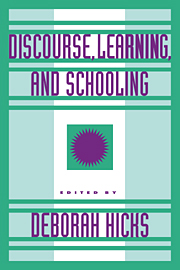Book contents
- Frontmatter
- Contents
- List of Contributors
- Acknowledgments
- 1 Introduction
- Part I Classroom discourses
- Part II Literacy, psychology, and pedagogy
- Part III Discourse and literacies
- 7 Sticking to the point: talk about magnets as a context for engaging in scientific discourse
- 8 Biliteracy development in classrooms: social dynamics and cultural possibilities
- 9 The role of the Black Church in growing up literate: implications for literacy research
- Afterword
- Index
8 - Biliteracy development in classrooms: social dynamics and cultural possibilities
Published online by Cambridge University Press: 03 May 2010
- Frontmatter
- Contents
- List of Contributors
- Acknowledgments
- 1 Introduction
- Part I Classroom discourses
- Part II Literacy, psychology, and pedagogy
- Part III Discourse and literacies
- 7 Sticking to the point: talk about magnets as a context for engaging in scientific discourse
- 8 Biliteracy development in classrooms: social dynamics and cultural possibilities
- 9 The role of the Black Church in growing up literate: implications for literacy research
- Afterword
- Index
Summary
The study of literacy has achieved prominence during the past three decades, including analyses of its social and intellectual consequences (e.g., Goody, 1987; Olson, Torrance, & Hildard, 1985; Street, 1984). Indeed, literacy has become one of the truly interdisciplinary areas of study, involving historians, linguists, anthropologists, psychologists, and educators, among others. Particularly revealing have been studies of people's ways with literacy, that is, the nature and uses of written language within specific and varied social conditions and practices (e.g., Heath, 1983; Scribner & Cole, 1981). These studies have shown that literacy is not a unitary phenomenon; that it is varied and complex; and that its possible consequences for thinking must be understood in relation to specific, diverse sociocultural practices, that is, to what people do with literacy within their circumstances of life. As Cole and Nicolopoulou (1992) put it, the emphasis of these studies is “on the actual ‘morphology’ of different kinds of literate practice; their analysis requires the investigator to take into account the structural, political, and ideological features of the society in question” (p. 345).
In addition, the theoretical emphasis on the “practices” of literacy has brought a fresh perspective to the study of literacy in schools.
- Type
- Chapter
- Information
- Discourse, Learning, and Schooling , pp. 221 - 246Publisher: Cambridge University PressPrint publication year: 1996
- 44
- Cited by



